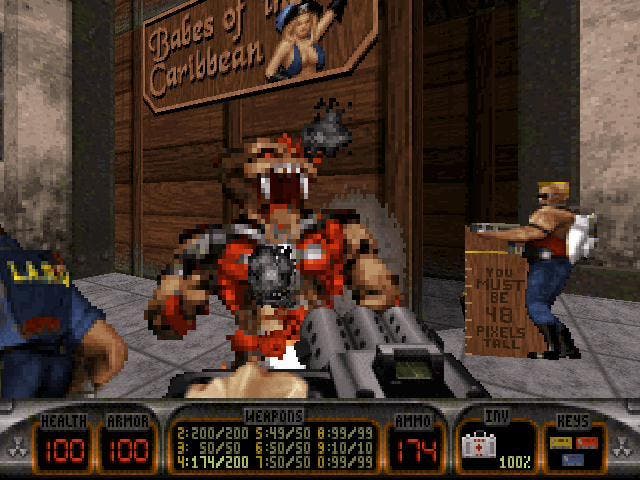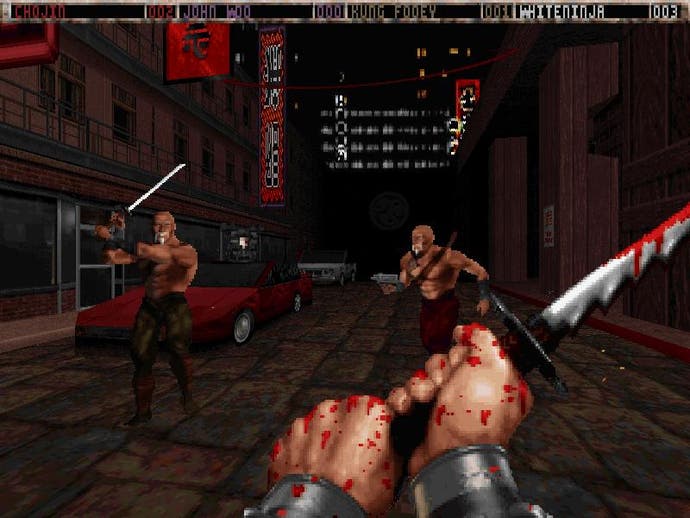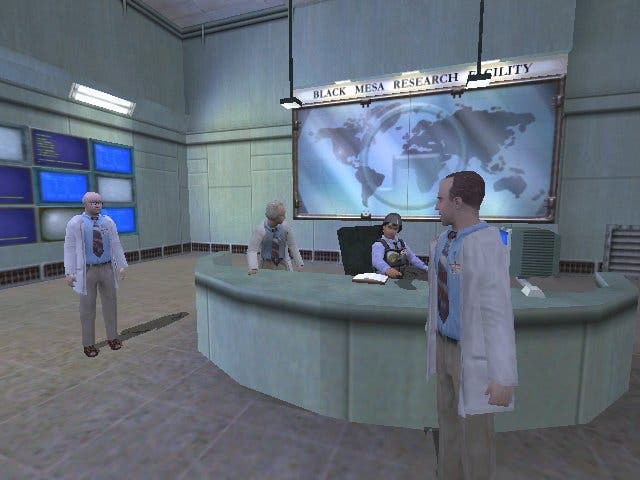Scott Miller of 3D Realms - Part Two
Interview - continuing our two part interview with 3D Realms co-owner Scott Miller
Picking up where we left off last week, we continue our chat with Scott Miller of 3D Realms to find out more about the state of the gaming industry, and his own company's work on the eagerly anticipated Duke Nukem Forever...

Dukology
The original Duke Nukem 3D broke a lot of ground in terms of level design and modifiable landscapes, but unfortunately due to it being an unaccelerated DOS game that can't easily be played over the Internet, it doesn't have the same presence as many lesser games that followed it.
The post-apocalyptic levels which made up the first episode and demo of the game were a breath of fresh air next to the uniform castles and dungeons that players had grown used to from id's games. Yet even though Duke Nukem 3D is considered by many to be one of the best games ever made, no group of developers emerged as the geniuses of Duke Nukem. The only individual who is generally associated with the development of Duke Nukem 3D is Richard Grey (aka The Levelord), who left 3D Realms to form Hypnotic (now known as Ritual) shortly after Duke Nukem was released.
"Richard Grey knows how to keep himself in the limelight", Scott told us. "For example, he wrote several magazine articles while working on Duke Nukem 3D, he's a prolific plan file writer, and he does a lot of interviews. Now then, this isn't a knock against Richard at all, but it just so happens that the other Duke developers prefer a lower profile, and so no one ever hears about them."
Which begs the question how many of these low profile people are still left from the original Duke3d team? "From Duke Nukem 3D we have George Broussard, Project Leader, Allen Blum, the lead level designer, and Lee Jackson, sound artist and musician. This may not sound like many, but the entire core team on Duke3D was only seven people, with many more who did spot contributions. George maintains the vision of Duke Nukem and is the overall master of everything that goes into the game. Allen has been involved with Duke Nukem since his conception, back in 1990. The original coder of all the Duke games, Todd Replogle, retired after Duke 3D."
"I will say this, the Duke Nukem Forever team is the best, most professional team we've ever had, and the game will reflect their enormous talent and dedication. We have 16 core people on the current team, not including voice talent and other contributions from contractors."

Divine Intervention
One of the big changes for Duke Nukem over the past year saw the Gathering of Developers acquiring the publishing rights to the franchise. Scott explained what this new agreement meant and how it came about.
"Quite simply when Infogrames bought our publisher GT Interactive, they brought a new mindset and working relationship that didn't fit with us very well, so it was agreed by us and Infogrames to part ways. We then contacted several top publishers who we thought would make a great new partner with us, and Take 2 won with the highest bid for the publishing rights. However, this is not for the entire Duke franchise, still entirely owned by 3D Realms, but for the publishing rights to Duke Nukem Forever and the entire back catalog of Duke Nukem games already under the publishing umbrella with Infogrames."
Hindsight is 20/20, and many Duke fans have speculated why certain decisions were made regarding the Duke franchise. Specifically why did 3D Realms make a few add-ons and then move on to a super ambitious sequel, instead of going the Doom to Doom II route and releasing another Duke game with new content and a slightly better engine? "We didn't have much of a choice", Scott admitted. "Making the add-on made sense because we didn't have the time to make a quick sequel, mainly because we had to help the Shadow Warrior team finish their game, which ate up a year of our time. It was only after Shadow Warrior's release that we started thinking about doing the next Duke game, very early in 1998."

Under The Bonnet
Nowadays a fair number of developers are actively trying to establish their game engines as brands in their own right and grab some of the action that companies like id and Epic are getting selling their technology. 3D Realms had one of the first successful endeavors in this area with the Build engine, which powered quite a few games in its day, yet the decision was ultimately made to license, first from id and eventually Epic, instead of building a new engine for Duke Nukem Forever.
"We actually tried to stay in the engine business by creating Prey and its groundbreaking portal engine, but unfortunately, that game and engine didn't work out due to it being a very complex project and not being directed internally by us in the proper manner, so we cancelled the entire project. We plan to try again with a new engine after Duke Nukem Forever's release, just because we're seeing diminishing advantages to engine licensing, unless you want to make what amounts to a professional conversion or mod."
After the cancellation of Prey, 3D Realms decided to focus on only one game at a time from here on out. "The world doesn't need more games, it needs better, more innovative games. So for us that means working on one game at a time and putting all of our best ideas in that one game. We discovered that while working on two games at once, Prey and Duke Nukem Forever, we had to split our best developers across two teams and finds ways to limit some of our best ideas for one game and other ideas for the other game. So now that we have experienced working on a single game with everyone pulling together, it's by far the best way to go."

Science and Industry
One of the more interesting tidbits in a recent New York Times article was an Activision official revealing that their average game now costs $4,000,000 to develop. With multi-million dollar budgets and three to four year development cycles, it doesn't seem like there is much margin for error. Scott Miller has a unique perspective on this being simultaneously a developer, publisher and shareholder in several game companies, so we asked his opinion on where the industry is headed.
"It's headed for further stagnation", was his gloomy response. "Publishers will take less risks as costs rise, and we're going to see more sequels and fewer new games that take chances by exploring new styles of gameplay. With the cost of games rising so high, fewer developers will be able to afford to make the games they want to make, and be under the publisher's thumb to make games in genres that are safe and proven."
"The game industry is having the same growth issues as other industries, like the movie industry. For example, when a movie like Alien comes it, it sets a new standard for any movie that follows that tries to tell a story about scary aliens on a spaceship, and so far no other movie has beaten Alien. And likewise, Star Wars is still the highwater mark for sci-fi space adventures. It will take a major effort and money to beat Star Wars. The same thing is happening within all of the gaming genres, with certain top games setting hard-to-beat standards, like Starcraft, Half-Life, and Diablo 2. So as the bar rises it becomes harder and more costly to leap over it.
"This is why publishers spend more time and money on developing games, to leap over that rising bar. In the game industry, playing limbo leads to bankruptcy. But then, so can always trying to beat the best. I think publishers should spend more effort on mixing genres in new ways and creating games that forge into new areas, avoiding heavy competition in established genres, and perhaps setting a standard in a new genre."
Forever?
In the meantime 3D Realms continue their work on Duke Nukem Forever, which many are hoping will be the first 3D action game to reach the high standards set by Half-Life. We didn't ask when it was actually going to ship, because we knew the answer would be the ubiquitous "when it's done".
Another question that did seem relevant though was whether or not Duke Nukem Forever would actually be seen running on PCs on the show floor at E3. While that isn't always an indicator that the game is less than a year away from shipping, it's a start. Scott told us that "the current plans are [for] no interactive demo. But we do have something special planned, and people will get to see a lot of new content from the game".
Take from that what you will, but the odds are Duke Nukem will be waiting a little while longer before his grand return to the small screen.
-
Scott Miller interview - Part One
